Greg Noe's reviews and writings
Cover Fart: my new bad video game box art Tumblr
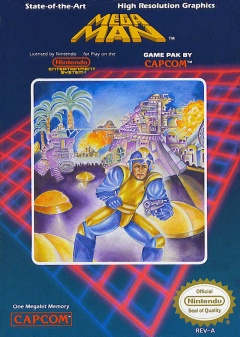 I've been meaning to spin out different kinds of content this year, and something that I've always loved to hate is bad video game box art. So I started a Tumblr for just that purpose, one nasty cover a day, forever. I've already got a few dozen queued up over at Cover Fart, so if you've got a Tumblr, follow me (is that the right verb?), otherwise slap the RSS link in your reader of choice or follow me on Twitter to get updates around noon everyday. Should take about 10 seconds out of your day and hopefully you'll get a smile out of it.
I've been meaning to spin out different kinds of content this year, and something that I've always loved to hate is bad video game box art. So I started a Tumblr for just that purpose, one nasty cover a day, forever. I've already got a few dozen queued up over at Cover Fart, so if you've got a Tumblr, follow me (is that the right verb?), otherwise slap the RSS link in your reader of choice or follow me on Twitter to get updates around noon everyday. Should take about 10 seconds out of your day and hopefully you'll get a smile out of it.I'd like to thank Nate for the name suggestion, as "Bad Game Box Art" just doesn't have the right ring to it. Also, I'd like to take a moment to praise Tumblr's queue system, you simply add a bunch of posts to a queue and instruct Tumblr to automatically pull from the queue X times a day between whatever hours you choose. My current Cover Fart settings are one a day between the hours of 12pm and 1pm Central Time, stupid easy to set up and even easier to maintain, though I wouldn't mind a randomize queue-pull feature so even I would be surprised each day!
Also props to Paul Abbamondi for his 2010 Worst Box Art feature, already stole a few covers from that list, but I'm really trying to pick out some unique ones that haven't necessarily been called out on the internet before.
Anyways, thanks for reading, and feel free to send me Cover Fart suggestions!
Illusion of Gaia
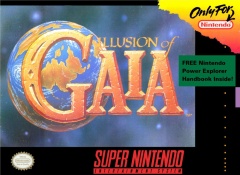 I didn’t play a whole lot of Enix games growing up. I rented a few titles for the Super Nintendo, including E.V.O.: The Search for Eden, Ogre Battle, and 7th Saga, but it wasn’t until I beat Star Ocean 2 during college that I could poke out the Enix notch in my belt. Their merger with Squaresoft in 2003 blew my mind, but I had grown up in the world where publishers were like armies, constantly battling it out with each other for supremacy; but in the real world it was all business, and the merger made sense.
I didn’t play a whole lot of Enix games growing up. I rented a few titles for the Super Nintendo, including E.V.O.: The Search for Eden, Ogre Battle, and 7th Saga, but it wasn’t until I beat Star Ocean 2 during college that I could poke out the Enix notch in my belt. Their merger with Squaresoft in 2003 blew my mind, but I had grown up in the world where publishers were like armies, constantly battling it out with each other for supremacy; but in the real world it was all business, and the merger made sense.Illusion of Gaia was released during the time when Enix was in a heated battle (business and fanboy-wise) with Squaresoft on the Super Nintendo platform. In its six year lifespan, both publishers released over 30 games each, many competing directly in sub-genres that seem too similar to be considered a coincidence. One of these face-offs was Secret of Mana from Squaresoft against Illusion of Gaia from Enix. Released in 1993, both games were action RPGs that happily broke the mold of the Final Fantasies and Dragon Quests.
But in the end, Squaresoft easily won the action RPG battle and the Super Nintendo war. Secret of Mana was an engrossing, multiplayer tale with a huge variety of weapons and magic, Illusion of Gaia was a rather rote, singleplayer, cobbled-together adventure with little variety. Here’s its review.
Bionic Commando and Bionic Commando
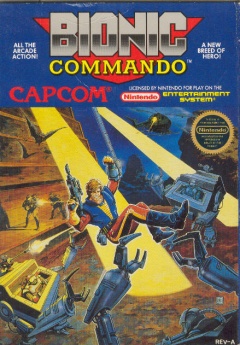 There once was a game named Bionic Commando, and then twenty years later there was another game named Bionic Commando. In some media, this would be called a remake, but when one features a generic soldier battling through different locations with a grappling hook and the other features a dreadlocked dude battling through an office building with cheesy one-liners, I wonder where the remake line is drawn.
There once was a game named Bionic Commando, and then twenty years later there was another game named Bionic Commando. In some media, this would be called a remake, but when one features a generic soldier battling through different locations with a grappling hook and the other features a dreadlocked dude battling through an office building with cheesy one-liners, I wonder where the remake line is drawn.Bionic Commando was released for the NES in 1988 by Capcom. It landed among a glut of platformers where characters did normal things like run and jump, but Bionic Commando bucked the trend and put you in the body of a slow-moving soldier with only his grappling hook at hand to move vertically. Its combination of solid but difficult gameplay and a branching level select entrenched it in the mind of gamers, which led to...
Bionic Commando was released on the Xbox 360, PlayStation 3, and Windows in 2009 by Capcom. It landed among a glut of actiony-platformer shooters where characters shot things until they died, and Bionic Commando did not buck the trend. Its combination of generic yet insulting gameplay and derivative story made it largely a totally forgotten game.
Neither Bionic Commandos is meant to be confused with Bionic Commando: Rearmed, which is an actual remake of Bionic Commando (for the NES), and released a year before Bionic Commando (the forgotten one on the more whiz-bangery systems). Or Bionic Commando: Rearmed 2, which is a sequel to the remake released before the game with the same name as the original.
I've played around with this tom-foolery before, particularly with Ninja Gaiden and Ninja Gaiden. A pair of games that both featured the same name and ninjas, but that's about it.
I'm going to play the first half-hour of each Bionic Commando, which adds up to an hour of Bionic Commandoness. I will then judge them entirely on 30 minutes of gaming and move on with my life.
Final Fantasy VIII - Original Sountrack
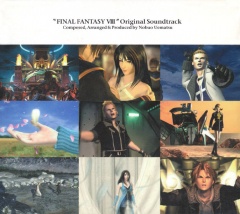 Remember the first time you heard the Super Mario Bros. theme? Or The Legend of Zelda overworld song? They are classic bits of music that have been replayed and remixed hundreds of times. Some games would undoubtedly not stand out as much in the nostalgic corner of our mind without their tunes to accompany them.
Remember the first time you heard the Super Mario Bros. theme? Or The Legend of Zelda overworld song? They are classic bits of music that have been replayed and remixed hundreds of times. Some games would undoubtedly not stand out as much in the nostalgic corner of our mind without their tunes to accompany them.A focus on quality game soundtracks seems to be on the rise, with indie titles Bastion and Jamestown both featuring a robust cache of songs that not only sound great while playing the game, but seem appropriate to listen to any other time of the day. There was a time at the end of the SNES ere and throughout the PS1 lifetime that video game soundtracks were huge. Through a combination of audio CDs becoming cheap to buy and MIDI files even cheaper to trade, games like Chrono Trigger, Donkey Kong Country, and Final Fantasy VI laid the groundwork for game music relevance.
Which brings us to Squaresoft's 1999 JRPG, Final Fantasy VIII. Nobuo Uematsu, longtime Final Fantasy composer, spent years writing music for the robust but limiting NES and SNES consoles before finally chewing his teeth on CD audio with the PS1. But Final Fantasy VII, while featuring a quality soundtrack, turned out to be merely preperation for Final Fantasy VIII. Here's my review of its Original Soundtrack.
Xenoblade Chronicles
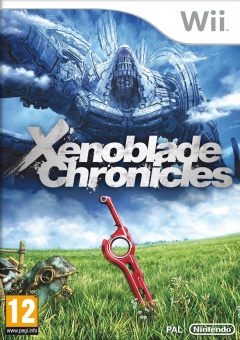 The Nintendo Wii is dead in North America. Like the Nintendo 64 and Gamecube before it, Nintendo of America has essentially abandoned the platform at least a year before their next console will be on sale. For any of those fans holding on to the idea that the Wii was still a targeted gaming platform for quality new releases, all their hopes were destroyed when NoA confirmed they would not be bringing Xenoblade Chronicles, The Last Story, or Pandora’s Tower across the Pacific.
The Nintendo Wii is dead in North America. Like the Nintendo 64 and Gamecube before it, Nintendo of America has essentially abandoned the platform at least a year before their next console will be on sale. For any of those fans holding on to the idea that the Wii was still a targeted gaming platform for quality new releases, all their hopes were destroyed when NoA confirmed they would not be bringing Xenoblade Chronicles, The Last Story, or Pandora’s Tower across the Pacific.As three highly touted RPG and action titles from Japanese studios, gamers were excited at the prospect of English releases, especially late in the Wii’s lifespan with only a new Zelda on the horizon. And in reverse of what was so common in the ‘90s, Nintendo of Europe decided to localize all three titles while North America sat out.
So here we are with an actual English version of Xenoblade Chronicles, developed by Monolith Software. Monolith is known for the Xenosaga series on the PS2 and the two Baten Kaitos games on the Gamecube, but most of the team is also made up of former developers of Xenogears and Chrono Cross at Squaresoft. Nintendo has owned a majority share of Monolith since 2007 so they are considered a first party developer.
Unless Xenoblade receives an official North American release, importing or piracy are your only real options, unfortunately. While some gamers are still optimistic, I saw how Nintendo ignored fans getting behind the EarthBound sequel Mother 3 a few years ago, and have little doubt in Nintendo of America ever touching it. But for what it’s worth, here’s my first hour review of Xenoblade Chronicles for the Wii.
Tower Defense Standoff - GRave Defense HD and Fieldrunners HD
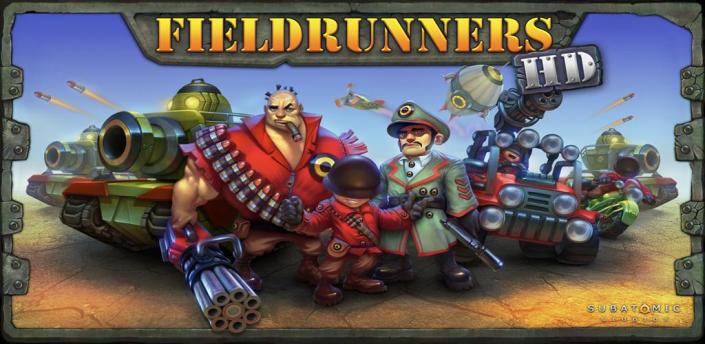 I’m pretty new to the tower defense genre, I missed out on the first few waves of games including the massively popular Desktop Tower Defense, and first experienced it with Plants vs. Zombies, which is probably a sub-genre of its own. But since buying my Android phone, I’ve been exposed to a lot of games I couldn’t imagine myself playing even a few months ago. Two of those are tower defense games.
I’m pretty new to the tower defense genre, I missed out on the first few waves of games including the massively popular Desktop Tower Defense, and first experienced it with Plants vs. Zombies, which is probably a sub-genre of its own. But since buying my Android phone, I’ve been exposed to a lot of games I couldn’t imagine myself playing even a few months ago. Two of those are tower defense games.Fieldrunners HD and GRave Defense HD are great examples of two distinct approaches at the tower defense genre. Both are easy to pick up and play for 10 minutes, but are amazingly effective at grabbing you in for over an hour. However, that is where the similarities end, and it is their differences that really define them.
Both titles are available right now for under $3 on the Android Market, and Fieldrunners is also available on a wide variety of devices including iOS and the Nintendo DS. Here’s my short reviews of Fieldrunners HD and GRave Defense HD.
The Secret of Monkey Island: Special Edition
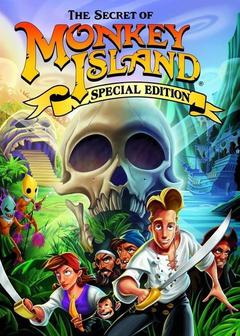 I first played The Secret of Monkey Island about 20 years ago. This was an era of launching games from DOS, Commander Keen, and wheel spinning copy protection. I played the game with my cousin, who would frequently lose the Dial-a-Pirate code wheel forcing us to wildly guess at the game’s opening question.
I first played The Secret of Monkey Island about 20 years ago. This was an era of launching games from DOS, Commander Keen, and wheel spinning copy protection. I played the game with my cousin, who would frequently lose the Dial-a-Pirate code wheel forcing us to wildly guess at the game’s opening question.The Special Edition released in 2009 thankfully does not have any code wheels (or even worse: always-on internet connection), but does feature completely redone high resolution art, a full voice cast, and the same brand of humor fans of the game know and love.
I’m personally a huge fan of the Monkey Island series, with the second holding a very special place in my heart and the third (gasp!) being my favorite. And while I beat the original when I was younger, I never held a lot of nostalgia for it, so this review is actually coming from a fan of the series who likes the first one the least in the trilogy And no, there is no fourth game.
Paul Eastwood originally reviewed the Special Edition two years ago when it was new, I finally got around to beating it this weekend after having it sit in my Steam library since release. Here is my review of The Secret of Monkey Island: Special Edition.
Jamestown: Legend of the Lost Colony
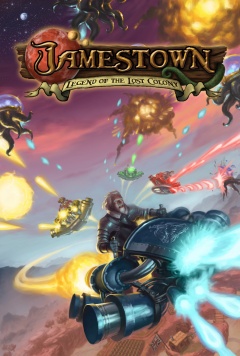 It’s been years since I played a shoot ‘em up. I bought Ikaruga during college basically as a blind buy, and Steve and I played a ton of four player Giga Wing 2 on the Dreamcast, but since then? Well, I played the first hour of Pocky & Rocky... that’s about it. I partially blame this on my system of choice being the DS for the last few years, and also because I’m not very good at the genre. Bullet hell is a term for a reason.
It’s been years since I played a shoot ‘em up. I bought Ikaruga during college basically as a blind buy, and Steve and I played a ton of four player Giga Wing 2 on the Dreamcast, but since then? Well, I played the first hour of Pocky & Rocky... that’s about it. I partially blame this on my system of choice being the DS for the last few years, and also because I’m not very good at the genre. Bullet hell is a term for a reason.But I was gifted Jamestown: Legend of the Lost Colony during the Steam Summer Sale (thanks Rowan Kaiser, writer at The A.V. Club), so I had the obligation to return to the shmup, essentially kicking and screaming. I knew very little about the just released indie shooter, so here are the quick details: Jamestown is an alternate history story of early American settlers on Mars. Suspension of belief required. Just imagine 17th century Europeans had spaceships and decided to settle Mars instead of North America.
Also know this: Jamestown is a great game, here’s my review.
Magicka
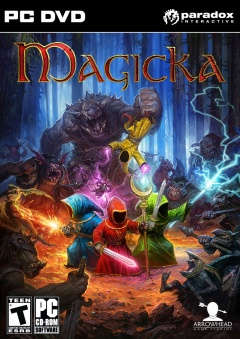 Managing a small group of diverse writers has its perks. When Ian sent me his review of Magicka a few months ago, it was my first exposure to the indie title that is garnering quite a bit of attention this year. Would I have heard of it eventually? Probably. Would I have picked it up during the Steam Summer Sale a few weeks back? Probably not.
Managing a small group of diverse writers has its perks. When Ian sent me his review of Magicka a few months ago, it was my first exposure to the indie title that is garnering quite a bit of attention this year. Would I have heard of it eventually? Probably. Would I have picked it up during the Steam Summer Sale a few weeks back? Probably not.But cheap games are great and cheap games with good reviews are even better, so I bought the four-pack of Magicka and spread the wealth among the writers. I found some time to finally get into the game during a business trip and gave its first hour a whirl.
Magicka is an action-adventure game where you control a small-hooded magician on his quest to... do something. You have near immediate access to a complete range of elemental spells that serve to challenge you in both finger and brain dexterity. Released in January on Windows, here is the first hour of Magicka.
Grand Prix Story
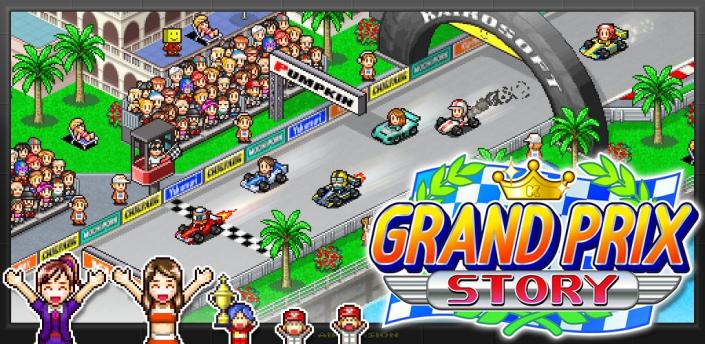 Kairosoft has quickly become my favorite developer on mobile platforms. With the English release of Game Dev Story last year, Kairosoft has placed themselves as the premier simulation creator on iOS and Android. Game Dev Story was followed up by the SimCity-esque Hot Springs Story, and then Android received the exclusive Grand Prix Story a few months back (Pocket Academy, a high school simulation was released exclusively for iPhone and iPad).
Kairosoft has quickly become my favorite developer on mobile platforms. With the English release of Game Dev Story last year, Kairosoft has placed themselves as the premier simulation creator on iOS and Android. Game Dev Story was followed up by the SimCity-esque Hot Springs Story, and then Android received the exclusive Grand Prix Story a few months back (Pocket Academy, a high school simulation was released exclusively for iPhone and iPad).Kairosoft has been a very active developer the last few years in Japan, with over 20 releases, including already released sequels to some of their English titles. Their lineup of games ranges from the ordinary to bizarre to simply inspired, with Game Dev Story serving as a catalyst for new markets.
I reviewed Hot Springs Story a few weeks ago, and quite enjoyed both the similarities and differences it had to Game Dev Story. From the games released outside of Japan, there appears to be two types of gameplay: the straight up numbers game like Game Dev Story, and the Hot Springs style layout designer/builder. Grand Prix Story falls under the former, Pocket Academy under the latter. Here's my review of Grand Prix Story for Android, played on an EVO 4G. I hope to have a Pocket Academy review soon.
